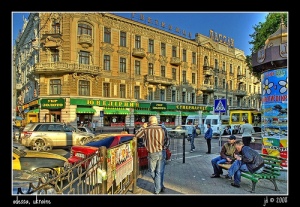Posts Tagged ‘isaac babel’
Meanwhile, if somebody opened up a door to my future
I’d probably turn away
And carry on reminiscing about the Armadillo Tea Rooms and Desperate Dan’s Café
There was, as mentioned in my 1997 poem Nobody’s Letting On, the Armadillo, where young men with Probe records bags and unkempt hair drank tea and ate quiche, and Desperate Dan’s – actually the café linked to the Open Eye photography gallery – which was run by a dedicated Evertonian socialist called Ronnie, who put the Blues’ miners strike-referencing 1984 FA Cup Final single, Here We Go, on the jukebox. And, at other times, there was the Tabac, where I heard the manager, Elaine, asking Adrian Henri if he was “still doing the writing?” More in line with the European bar bistro idea of café life, there was the iconic and recently departed Everyman Bistro , where my favourite character was a solo drinker – we called him Cheerful Charlie Chisholm – who wore a trilby and camel coat, suit and tie, and who would always scour each of the Bistro’s three rooms in expectation of finding the people he’d arranged to meet, and always find no-one.
, where my favourite character was a solo drinker – we called him Cheerful Charlie Chisholm – who wore a trilby and camel coat, suit and tie, and who would always scour each of the Bistro’s three rooms in expectation of finding the people he’d arranged to meet, and always find no-one.
 But there was also Els Quatre Gats, Barcelona’s modernista hangout which incubated Picasso’s early career; and Le Forum in Arles, the precise topology of whose terrace has been imprinted on our consciousness by Van Gogh; there is the Savoy Patisserie, a bohemian enclave in Orhan Pamuk’s beloved Istanbul; and Café Momus, which provided Rodolfo, Mimi, Schaunard, Colline and Marcello thankfully cheap food and the odd cheap thrill in La Bohème.
But there was also Els Quatre Gats, Barcelona’s modernista hangout which incubated Picasso’s early career; and Le Forum in Arles, the precise topology of whose terrace has been imprinted on our consciousness by Van Gogh; there is the Savoy Patisserie, a bohemian enclave in Orhan Pamuk’s beloved Istanbul; and Café Momus, which provided Rodolfo, Mimi, Schaunard, Colline and Marcello thankfully cheap food and the odd cheap thrill in La Bohème. Writers sit and scrawl in such cafés, but they are also sustained by the life that goes on there, that spills in from and out to the cities – their cities – whose many lives sustain their writing.
Writers sit and scrawl in such cafés, but they are also sustained by the life that goes on there, that spills in from and out to the cities – their cities – whose many lives sustain their writing.
As soon as we land in the Greek café at the heart of Isaac Babel‘s The Aroma Of Odessa – he dispenses with the nicety of bringing us in through the doorway – we can recognise it as one of the cafés from our own memories and imaginations:
I am wandering between tables, making my way through the crowd, catching snippets of conversation. S., a female impersonator, walks past me. In his pale youthful face, in his tousled soft yellow hair, in his distant, shameless, weak-spirited smile is the stamp of his peculiar trade, the trade of being a woman. He has an ingratiating, leisurely, sinuous way of walking. His hips sway, but barely. Women, real women, love him. He sits silently among them, his face that of a pale youth and his hair soft and yellow. He smiles faintly at something, and the women smile faintly and secretively back – what they are smiling at only S. and the women know.
[translation by Peter Constantine in The Collected Stories of Isaac Babel, Norton 2002]
Nowadays, we call it the Third Space, the not-work, not-home in which we perfect a public manifestation of our private selves. Moving between the tables, we also move between tolerance, suspicion and understanding. This very short vignette is from the 1920s but the “aroma” of the title has been with him through his life, since his birth in the Odessa ghetto. It’s the smell of distance, of marginalia (indeed, of periphery) – the Jew from the ghetto in the port city at the edge of land, in an outpost of empire, amidst drag queens and their surreptitious shared smiles with the women, and
Fat, serene wives of movie-theater owners, thin cash-register girls (“true union members”), and fleshy, flabby, sagacious café-chantant agents, currently unemployed…
But it’s also an aroma of an intense blend and, in his passeggiata amongst the tables, Babel recognises the motifs of that uncut internationalism peculiar to port cities, fostered by the transit of produce and people. The recycling of themes and phrases mitigates towards meditation rather than narrative development, and brings to mind a poetic expression like Paul Célan’s Death Fugue, but there is a particular storytelling skill being deployed here, and it’s one any writer can attempt in his or her own familiar Third Space. What Babel seems to be taking is a snapshot but it’s also an X-ray. Another way of putting it is that the story is written from the point of view of the eternal outsider but it’s also written from beneath the skin of every inhabitant of the café, the city, his city, our cities.

